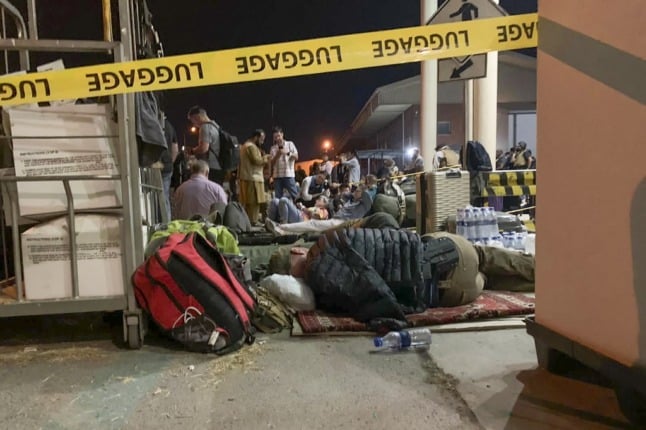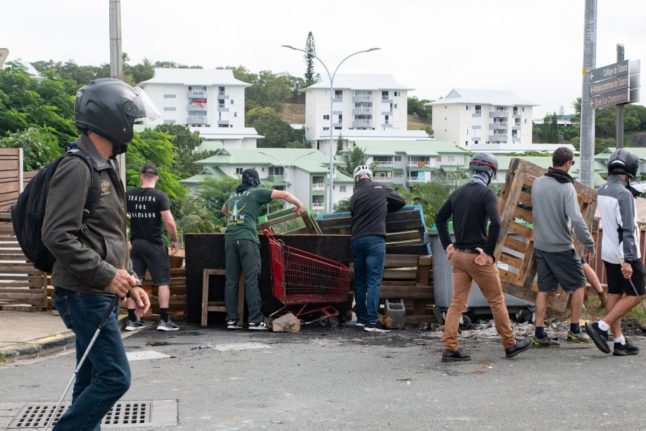The French military is taking people out of Kabul on military planes to Abu Dhabi, from where they are to be flown on passenger aircraft to Paris. A first contingent of 41 French and foreign nationals arrived in France on Monday.
Amid the chaos of the fall of Kabul, French embassy staff moved to the airport where they continues to process visas for Afghans under threat from the Taliban.
And on Tuesday, dozens of mayors from across France offered to welcome refugees, saying “we have the capacity to welcome with dignity”.
“Nearly 200 Afghans who worked for France or who are under threat have just been evacuated from Kabul, as well as French and foreign nationals,” President Emmanuel Macron said in a tweet on Wednesday, adding that the operations would continue.
Près de 200 Afghans qui ont travaillé pour la France ou qui sont menacés viennent d’être évacués de Kaboul. Ainsi que des Français et des ressortissants étrangers. À nos armées, policiers et équipes diplomatiques qui organisent ces opérations sensibles, merci. On continue. pic.twitter.com/xHSreTLOLI
— Emmanuel Macron (@EmmanuelMacron) August 18, 2021
The foreign ministry said 216 people were on board the flight, including 25 French, 184 Afghans “from civil society in need of protection” as well as seven other foreign nationals.
It said that this operation meant that most people – both of French and Afghan nationality – who had taken refuge at the French embassy in Kabul, had now been evacuated. The French embassy is now working out of the airport.
The mayor of Besançon, Anne Vignot of the Green party, wrote: “I respond to France’s duty of humanity and announce that my city of Besançon is ready to welcome Afghans who seek refuge in France. We have the capacity to welcome with dignity.”
Maire écologiste, je réponds au devoir d'humanité de la France et annonce que ma ville de #Besançon est prête à accueillir les Afghanes et Afghans qui cherchent refuge en France et arriveront sur notre sol. @EmmanuelMacron nous avons les capacités d'accueillir dignement.
— Anne Vignot (@Anne_Vignot) August 17, 2021
The Green mayor of Strasbourg, Jeanne Barseghian, added that her city “in its long tradition as a hospitable city, is ready to welcome Afghans who seek refuge in France” while the Socialist Olivier Bianchi added: “Clermont-Ferrand will be at the meeting place to welcome those who are threatened in their freedom. We must live up to our values.”
Macron in a speech on Monday night said France was ready to help activists, artists and journalists who risk being targeted because of their work.
“We will help them as it is the honour of France to be side-by-side with those who share our values,” he said. Addressing fears that the Taliban will restrict the rights of women, he added: “Afghan women have the right to live in freedom and dignity.”
“We will say very clearly to those who opt for war, obscurantism and blind violence that they have chosen isolation,” he said.
But he stirred controversy with other parts of his speech, which called on EU leaders to work together on a response that was “robust, coordinated and united” to prevent irregular migration by harmonising criteria and showing European solidarity.
“We must anticipate and protect ourselves against significant irregular migratory flows that would endanger the migrants and risk encouraging trafficking of all kinds,” he said.
France in July stopped deporting people to Afghanistan because of the security situation.



 Please whitelist us to continue reading.
Please whitelist us to continue reading.
I sincerely hope this government and others are able to separate out the terrorists from among the legitimate refugees. We don’t seem to even be trying to do this here in the USA.
I find it strange that these Mayors are eager to house Afghan refugees yet seem to show no interest whatsoever in the existing thousands of migrants living rough in the Pas-de-Calais who risk death crossing the Channel to you know where.